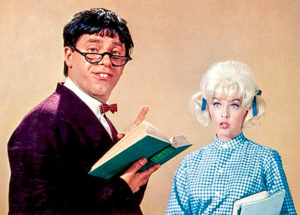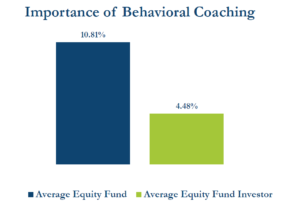
Reading Time: 6 minutes
President Trump announced recently that we have 15 days to slow the spread of Coronavirus. This has required many of us to hunker down in our homes. Many parents are having to homeschool their children and use video conferencing to meet with clients and coworkers. As a result, many Americans have become anxious and stir-crazy. We’ve always been independent, and this task of sitting still is proving difficult for us. But, we aren’t necessarily at fault. It’s not just our children who have a problem with sitting still, and there is a logical explanation of why as adults, we don’t want to sit at home and binge-watch Netflix. As you await the return of sports, I explain why goalkeepers also have a hard time standing still during penalty kicks. I also explain why doing nothing with your portfolio during stressful periods of time may be best.
Why the Nutty Professor Was Right
One of my favorite movies growing up was The Nutty Professor with Jerry Lewis as Professor Julius F. Kelp and Stella Stevens as Stella Purdy. In one of the early scenes, Professor Kelp upsets a strong high-school football player, who responds by picking up the weak science teacher (Lewis) and shoving him sideways into a closet full of beakers and chemicals. The professor is indeed embarrassed, and with a squeaky voice, he calls out to the class, “Don’t just do something…..Sit there!” Because he is flustered, the nutty professor intended to say, “Don’t just sit there….do something.”
Like many of you, I find myself watching the news and scary headlines and wanting to just do something. It is a very common psychological trait to want to react to the action, drama, fear, headlines, and “fill-in-the-blank” news story of the day. You look at your portfolio, you see that the balance is lower than you expected, and you want to react. You think to yourself, “This time is different.” Although the recent headlines can be scary, if you are a student of history, you understand that this too shall pass. Professor Kelp was right the first time…sometimes the best thing to do is to do nothing.
Why Soccer Goalkeepers Dive
The match is on the line. The game is tied and has come down to a penalty shootout.
This final penalty kick will decide it all. Sweat is dripping down the kicker’s and goalie’s faces. They stare each other down. The kicker takes a deep breath, as all the pressure is on him. The referee blows his whistle. The kicker trots a few steps toward the ball, aims, and kicks as hard as he can. The goalie dives to the left, but…
GOOOOOOOAL!!!!!!!
The kicker and his team celebrate. The goalie buries his head in his hands as he kneels in disbelief. He guessed incorrectly. If only he had listened to science, the goalie would have just stood in the middle of the goal. Then, he might have had a better chance to make the save of his life.
Several years ago, a team of Israeli researchers examined the distribution of 286 penalty kicks as well as the direction in which the goalie jumped (if any). They found that the goalie has the best probability of preventing a goal if he simply remains in the center. Based on science, doing nothing is the best thing a goalkeeper can do in a penalty kick situation.
But who wants to be a goalie that just stands there? Despite the fact that the best option statistically is to just stand still and do nothing, goalkeepers usually dive to the left or right. But why?
Action Bias
A goalie has a strong incentive to “do something,” which is a psychological phenomenon called action bias. Who wants to just stand there and risk looking stupid as the ball goes by to the right or left? Ironically, the authors of Freakonomics also analyzed penalty kicks and found penalty kickers almost never go right down the middle, which is also the best option statistically. Why is the center the best option? Because the goalie usually dives.
Action bias is a two-edged sword because it is the tendency:
- To think that value can only be realized through action
- To act as opposed to practice restraint — when both are reasonable options.
These two are related. The first formulation informs the second. We try to take action rather than restrain ourselves because we have developed a bias toward valuing action as the primary producer of value. We tend to fool ourselves into believing people who are doing the most stuff are creating the most value. Nothing could be further from the truth. In many cases, it’s the person who doesn’t act quickly or often — who restrains himself — that ends up affecting real change. It often doesn’t pay to make a quick decision or to be the first to act or react.
Sometimes, taking action can actually prevent us from reaping the full value of something. The Chinese have a name for it: wu wei — sometimes called “non-doing.” The idea is you can harness the power and momentum of the natural cycles and flow of things to gain the value you’re looking for. To the vast majority of people — who are steeped in action bias — this looks like nothing is being done to create value. But that is far from the truth.
Thinking, observing, or simply waiting are all work. Just because no movement or stress is observed doesn’t mean nothing important is taking place. It is no wonder that we keep falling prey to the action bias. Overcoming it takes patience, and it requires us to simply sit with the current environment and hold tight. We’re not very good at doing that.
Just like it takes patience to take the slower, calculated action, it also takes a more patient and calculated analysis to see all the value that such actions do bring. Why? Because the effects tend to be long-term, widespread, and defy conventional measurements and metrics.
What can Intelligent Investors Learn
Goalkeepers can teach investors a thing or two when it comes to their portfolios.
First of all, it often is very hard to just sit there with your portfolio when there is a lot of action all around. Scary headlines, market volatility, and constant social media pressures make it very hard to not want to trade your portfolio. Our feeling of a need to do something can become nearly impossible without the help of an accountability partner.
Second, investors can be their own worst enemies. This is why investors often underperform their underlying investments.

The reason the average investor blows upwards of 60% of the return of the average fund over any given 20 year period is that he behaved inappropriately. Instead of letting his portfolio work, the average investor did something else–a whole lot of other things, which had three important characteristics in common:
- They were always the wrong thing to do.
- They were done at the wrong time.
- They were done for the wrong reasons.
Rebalancing Helps Maintain a Diversified Portfolio
The financial markets don’t like bad news and the current coronavirus outbreak is no exception. As we have seen this year, many investors are tempted to “do something.” But in times of volatile markets, the best move of all for long-term investors is often no move at all. Though this is hard, it is even harder to buy investments that have performed relatively poorer, and sell investments that have performed relatively better in the short run. This requires extreme discipline.
One of my favorite sayings from Warren Buffett is, “It is wise to be fearful when others are greedy and greedy when others are fearful.” This is a discipline that requires an iron-will and long-term perspective. We rebalance our client’s portfolios, not because we believe we can time markets, but because we believe maintaining a proper risk alignment is vital for long-term success.
In the past, investors who sold when there was short-term volatility, bad news, and falling prices, missed significant rebounds that shortly had stock markets back to prior levels. There’s no guarantee that today’s market will play out the same way; stocks have sometimes taken days, months or longer to regain losses. But, remember that knowing when to get back in is just as hard as knowing when to get out.
We are Here for You
We continue to closely monitor market conditions, and we are committed to helping navigate this volatility. As a practical application, consider turning off the news and going out for a walk with a friend or loved one. If you’ve never created a written financial plan or if you don’t have your portfolio and risk integrated with your financial plan, please give us a call. At Intelligent Investing, we can help you with your action bias and innate desire to “do something.” We’d love to help you by being your financial accountability partner and integrating your portfolio with your financial plan and risk tolerances.
Schedule a short discovery call or meetingBonus Material
As we have read, kickers and goalies should aim and remain in the center of the goal for their best chances for success. One particular type of center shot is nicknamed a “Panenka”, after Czech player Antonin Panenka. He calmly lofted the ball into the middle of the goal, scoring the final penalty in the 1976 European Championship to seal Czechoslovakia’s only major success. If you have 2-minutes, you should check out the highlights.
Image attribution: Copyright 1963 by Jerry Lewis Enterprises, Inc. and Paramount Pictures Corporation. / Public domain